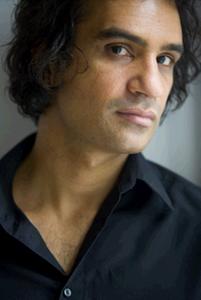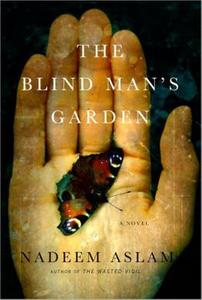
|
|
| photo: Richard Lea-Hair | |
Nadeem Aslam is the author of three novels: Season of the Rainbirds, which won a Betty Trask Award and was long-listed for the Man Booker Prize; Maps for Lost Lovers, winner of the Kiriyama Prize, short-listed for the IMPAC prize, long-listed for the Man Booker Prize and a New York Times Notable Book; and, most recently, The Wasted Vigil. He is also the recipient of a Lannan Literary Fellowship.
Aslam moved with his family from Pakistan to England when he was 14. He studied biochemistry at the University of Manchester, but left in his third year to become a writer. He lives in London. His new book, The Blind Man's Garden, was published by Knopf on April 30, 2013.
On your nightstand now:
The Testament of Mary by Colm Toibin. This book reminded me of two great short stories: D.H. Lawrence's "The Man Who Died," about a resurrected Christ; and Chekhov's "The Bishop," about a bishop whose mother comes to visit him. So Lawrence's Collected Stories and Chekov's Collected Stories are on my nightstand, too.
Favorite book when you were a child:
The Adventures of Amir Hamza--stories rooted in the legends about Muhammad's paternal uncle. Told in roadside teahouses from Iran to India for 1,000 years, they are full of heroes, villains, djinns, dragons, hair-raising chases and rescues.
Your top five authors:
William Faulkner: His brilliantly passionate Nobel Prize acceptance speech alone renders him immortal. D.H. Lawrence: It is said about Giotto that he taught painting to weep. Discovering Lawrence when I was young was to realize that prose could touch, smell, taste, see, hear. Gabriel García Márquez: He is justly famous for magical realism but his depiction of the ordinary day-to-day realism is brilliant and precise. Czeław Milosz: More than any other writer he told me that the world was my home, its large and small sorrows and joys, its love and lovelessness. For me his work established contact between the present moment and eternity. Intezar Hussein: the great Pakistani writer. His 1,120-page Collected Stories is always on my desk as I write.
Book you have faked reading:
None.

The Ruins of Empire by Pankaj Mishra. Pankaj Mishra's writing is what I turn to first when I need to make sense of the world in political and historical terms; and this new book helps us not just re-see but reimagine the 20th century.
Book you have bought for the cover:
The magnificent Pakistani painter Chughtai (1897-1975) designed covers for countless books and literary journals published in Pakistan, a mark of the great artistic and collaborative spirit in Pakistan's cultural capital, Lahore, half a century ago. Whenever I am in Lahore, I visit dusty second-hand bookstalls and pavement booksellers to look for books with Chughtai's covers. I buy them regardless of the subject matter. Each is a masterpiece of color, composition and wit.
Book that changed your life:
My high-school science textbooks. Subjects like evolution began to be taught to 14 year olds when I was in high school in Pakistan. The school's religious teacher was deeply unhappy about it, I remember. And to an extent he was right to be alarmed--the science books made me question revealed faith.
Favorite line from a book:
Too many. Perhaps all of them. I love knowledge (which tells us how things are), and I love imagination (which tells us how things could be).
Book you want to read again for the first time:
Great writers are the voice in our head telling us what we already know. So at one level we are never reading a great book for the first time.

